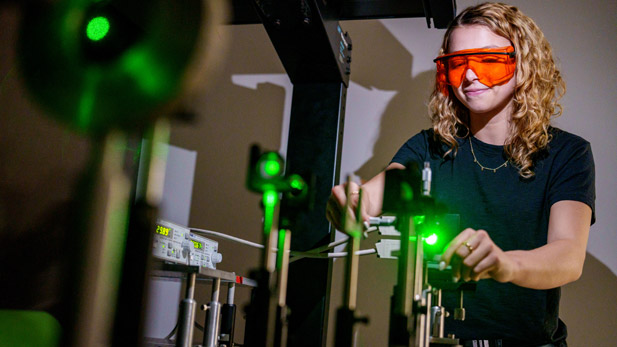Rose-Hulman Receives Grants in Support of Optical Engineering Research Projects

Rose-Hulman’s Department of Physics, Optical Engineering, & NanoEngineering has received grants from the Indiana Small Business Development Center (ISBDC) and Minus K Technology Inc. in support of innovative optical systems that could impact America’s health care services.
Rose-Hulman Institute of Technology’s Department of Physics, Optical Engineering, and NanoEngineering (PHON) has received grants from the Indiana Small Business Development Center (ISBDC) and Minus K Technology Inc. to provide state-of-the-art technology that will allow students and faculty to develop innovative optical systems that could impact America’s health care services.
This technology further enhances the research and project development process within Rose-Hulman’s PHON Department, which is recognized nationally for being on the leading edge of undergraduate optics education, according to Head of the Department and Professor Galen Duree, PhD. Rose-Hulman was among the first schools in the nation to offer an undergraduate optical engineering degree and the department is preparing students in a variety of specialized career fields, including laser systems, fiber optics, imaging and image processing, and silicon photonics.
ISBDC’s Indiana Technical Assistance Program is supporting a technology development partnership between Innovations Foresight LLC and Associate Professor of Physics, Optical Engineering, and NanoEngineering Syed Azer Reza, PhD, and PHON students. They are currently developing the first prototype of an artificial intelligence-based ophthalmic system to measure vision defects within the human eye, like the advanced wavefront sensing equipment currently used in hospitals.
“Our goal is to use AI-based wavefront sensing to achieve the same non-perception-based eye testing with a tiny fraction of the cost. This will allow small scale optometrists to offer the same services at a low cost as high-end hospitals do at a much higher cost,” said Reza.
Work on this project will continue for the next six months.
Meanwhile, Minus K Technology has provided aspects of its innovative vibration isolation system to support projects being supervised by PHON Professor Maarij Syed, PhD, and Reza. This is the same technology that Minus K provides NASA’s James Webb Telescope. It will allow Rose-Hulman students and faculty to make sensitive optical measurements necessary to understand the behavior of a class nanoparticles that are critical in magnetic resonance contrast imaging, drug delivery, and cancer hyperthermia therapy.
Following a competitive application review process, Minus K provides between three and six passive vibration isolators annually to assist university programs in research projects.
Learn more about the exciting things happening in the Rose-Hulman’s PHON program at www.rose-hulman.edu/physics.